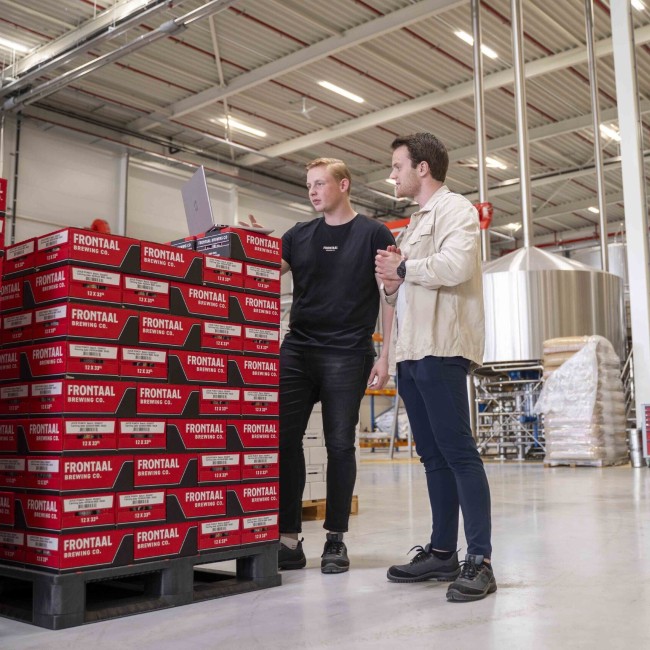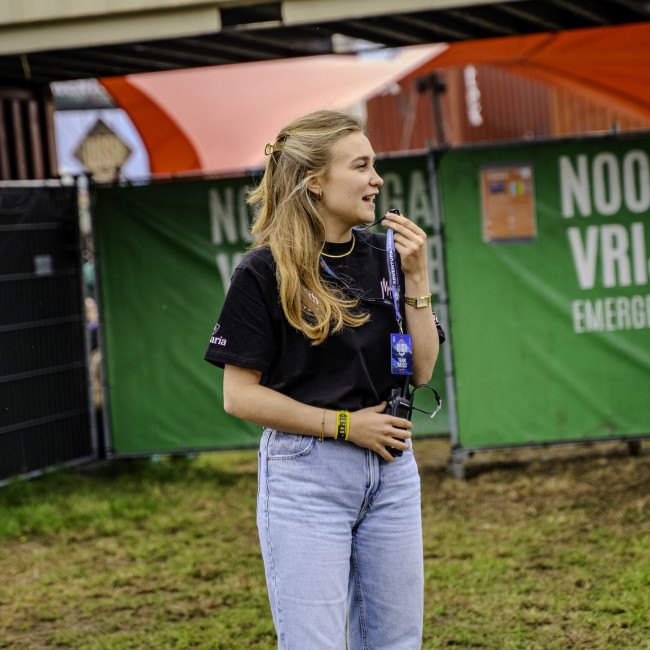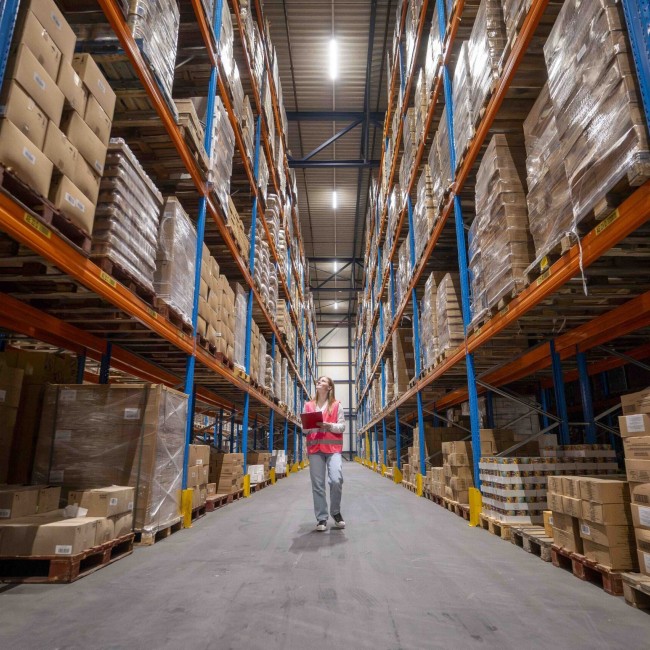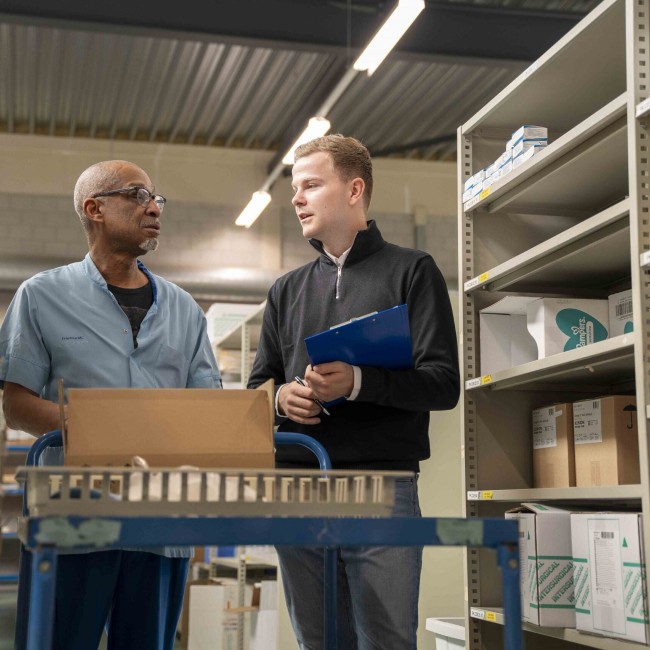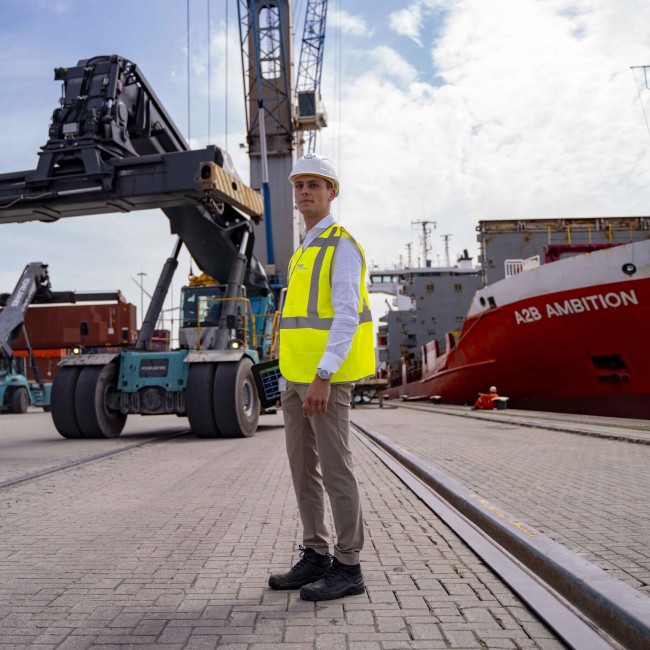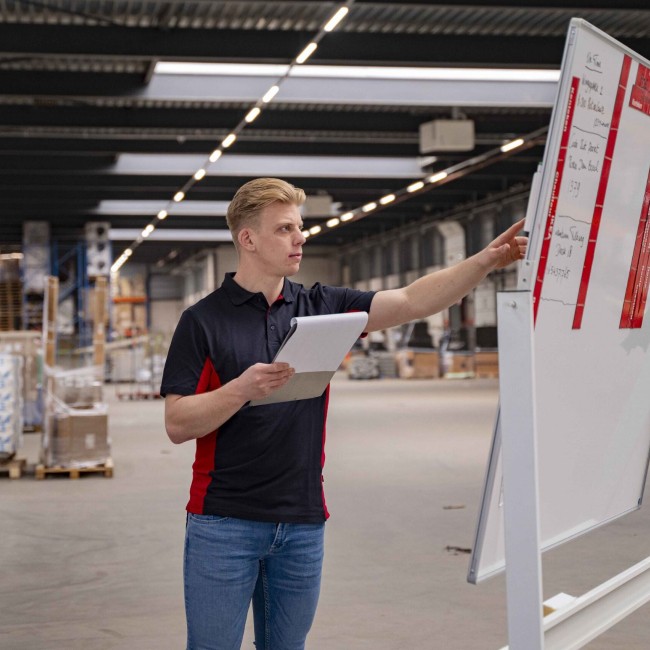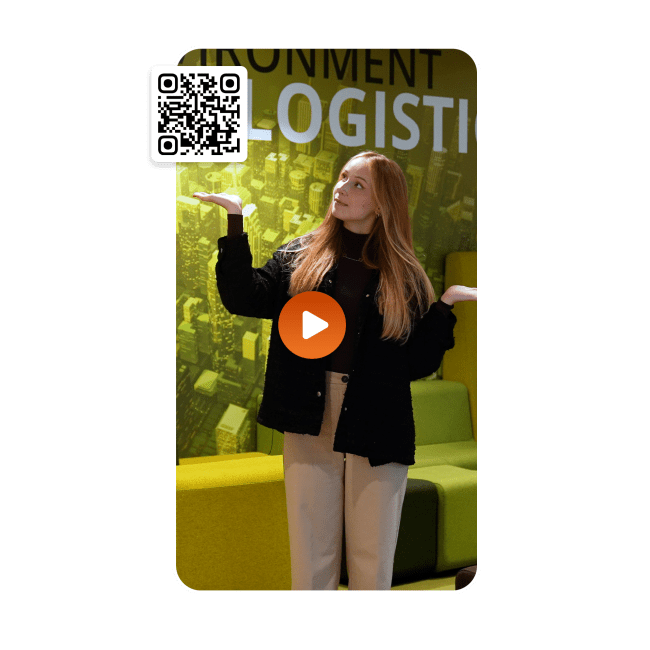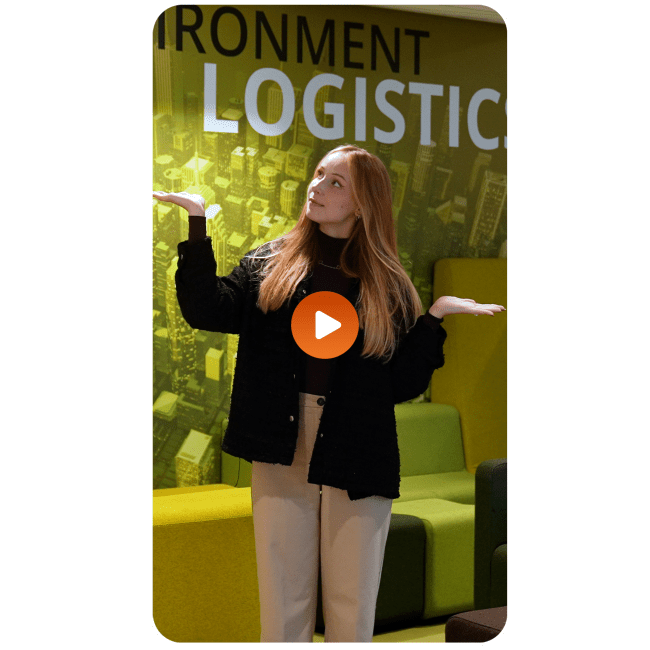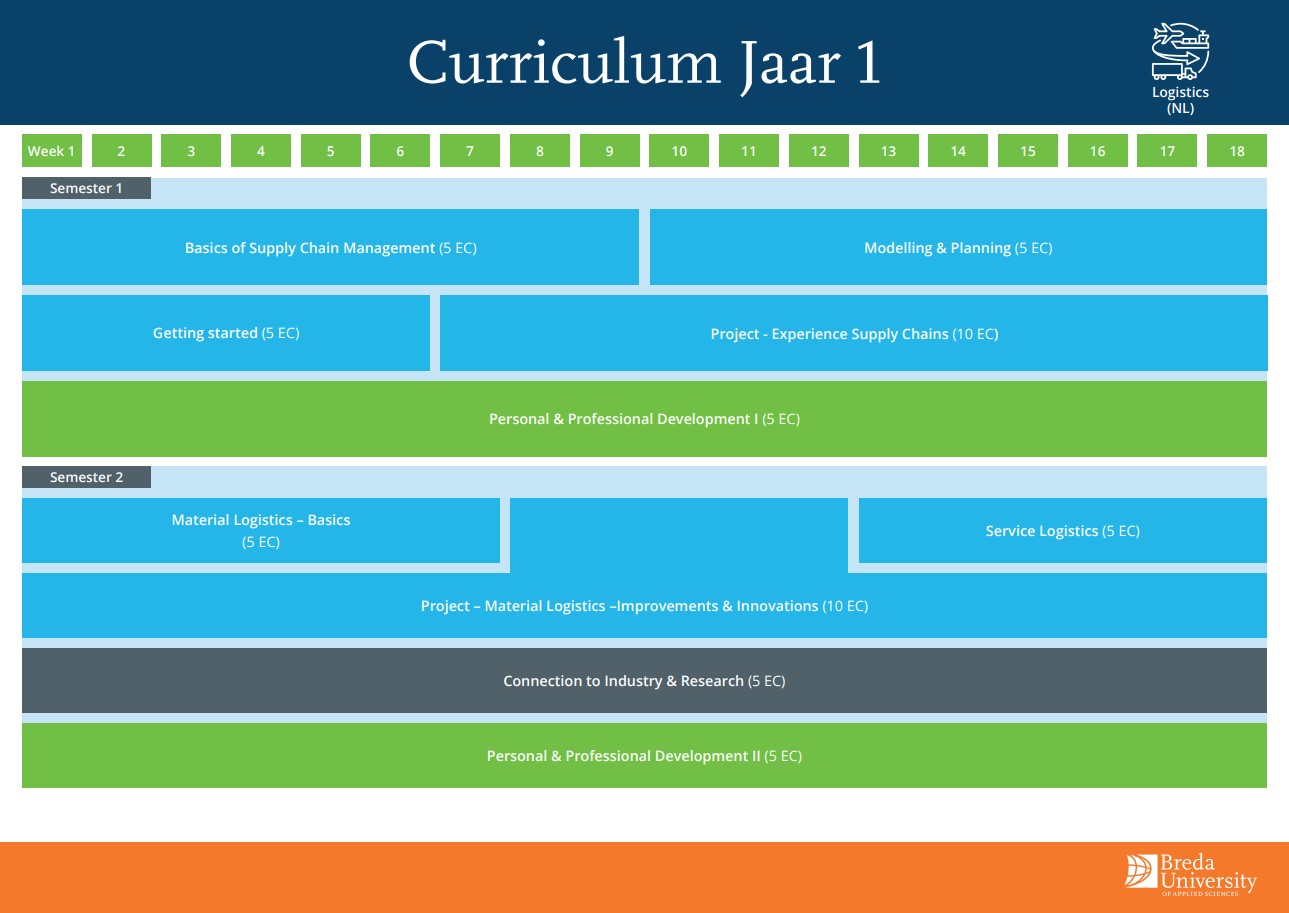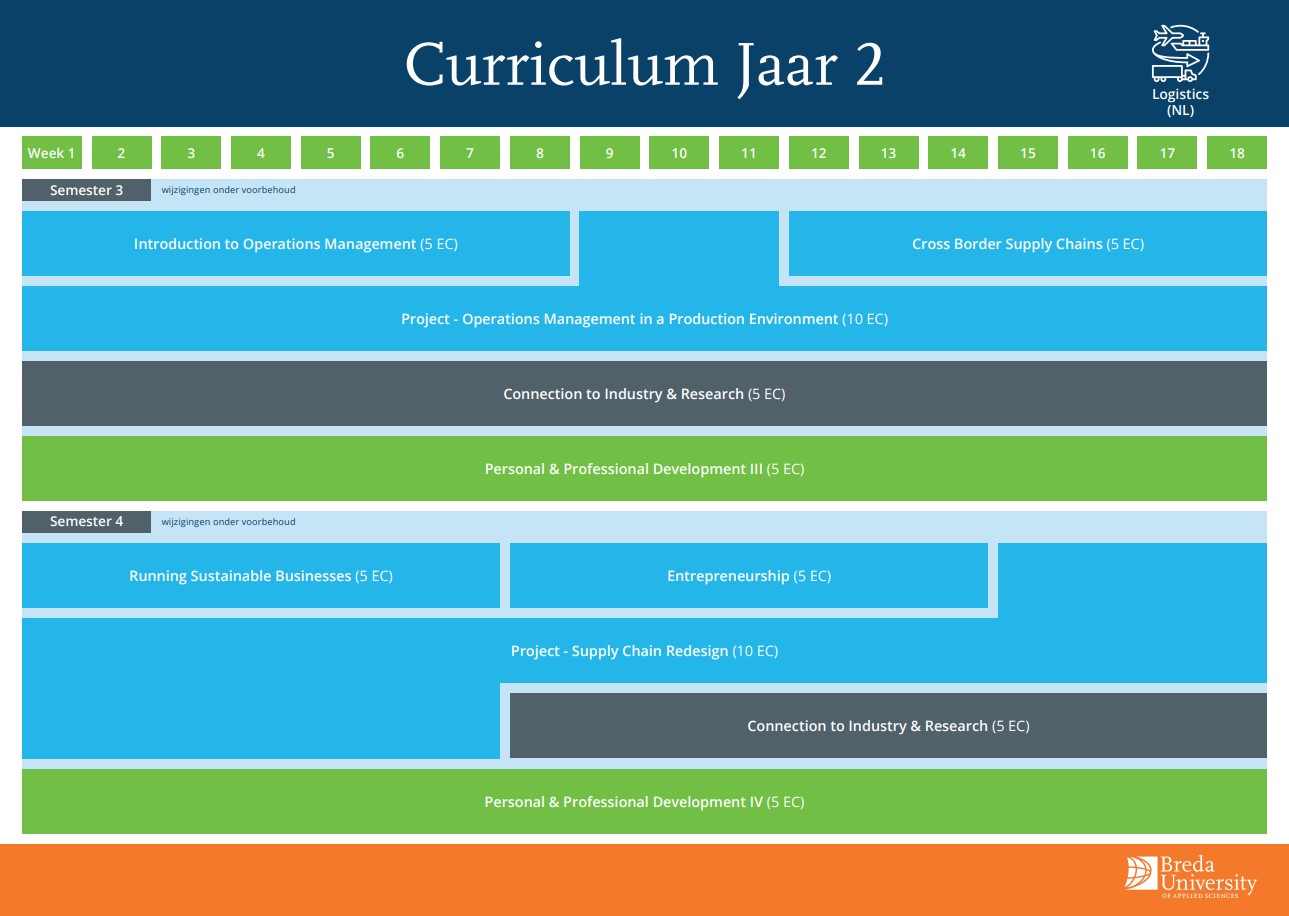Come and meet us
Walking around on campus is the best way to truly experience BUas. Sign up for one of the upcoming events or activities.
Discover the Logistics Management programme
Discover the Logistics Management programme in an interactive story. Swipe through the shorts, see what you can become later and take the quiz to see if this study suits you!
Check out the interactive story
Study overview
Year 1
The first year, also called propaedeutic year, consists of two 18-week semesters. In this year, you lay the foundation by acquiring the necessary knowledge and skills that you will need later in your studies and professional practice.
- Semester 1
After a general introduction, you start working on real company assignments to explore the several functions and departments within businesses. You work in groups on projects in which you apply knowledge gained directly. In addition, you will learn about trends and innovations in logistics and supply chain management. Examples of the modules you will attend:
- Getting Started - You will be introduced to the world of logistics and learn about the steps in a supply chain, while reflecting on your own ambitions in the industry.
- Basics of Supply Chain Management - You will be introduced to the processes of a logistics chain, from raw material to delivery to the customer.
- Experience Supply Chain Management - You will start a fictional manufacturing company through a simulation game and learn how to manage logistics processes and finances.
- Modelling and Planning - In this module, you will learn to visualise processes, create schedules, calculate costs and work with software systems.
- Personal & Professional Development - This module helps you find your way in the Logistics programme and focuses on study skills and personal development.
- Semester 2
- Material Logistics – Basics - You will learn the basics of transport, storage, and inventory control, including financial and legal aspects.
- Material Logistics - Improvement & Innovation - You will work on a project to set up a new distribution centre and improve existing logistics processes.
- Service Logistics - Basics & Innovation - You will learn about services logistics, focusing on events and healthcare. You will work in your group on a business case for real businesses such as Efteling or Pinkpop.
- Connection to Industry & Research 1 - You will apply the knowledge and experience acquired in practice-oriented situations in which you yourself will choose what segment you want to work in.
- Personal & Professional Development - You will explore your personal qualities, learn about cultural diversity and make choices matching your ambitions.
- Alternative route
In year 1 you can still switch to Logistics Engineering. Here the focus is on the technical and digital sides of logistics processes. You will learn how to optimise activities in production and distribution centres through the use of robots, drones and artificial intelligence.
Want to know more about what year 1 looks like? Have a look in the student handbook.
Years 2, 3 and 4
In the second year of Logistics Management you will delve into practical and sustainable topics to a higher degree. In the third year you will do your work placement and further specialise. The fourth year offers a minor or an exchange abroad, and you will finalise your studies with a graduation placement.
- Year 2
In the second year you will have more freedom of choice. You will further broaden your logistics knowledge, and start working toward the following learning outcomes:
- Planning and optimising production processes: Learning how to improve production processes and manage international supply chains, including customs procedures and transport methods.
- Improving supply chains: Using data analysis and Business Intelligence to redesign and enhance supply chains.
- Sustainable entrepreneurship and CSR: Discover how to start your own business and develop a business plan paying attention to sustainability and corporate social responsibility (CSR).
- Cooperating with businesses: Working together with businesses on real research projects to gain practical experience
- Preparing for the work placement: Preparing for your placement and focusing on your personal and professional development.
At the end of the year, you can delve into a specific area of logistics:
- Production logistics
- Distribution logistics
- Warehousing
- Healthcare logistics
- Event logistics
More detailed information about the themes can be found under the tab sheet ‘Specialisations’.
- Placement (semester 5)
During the third year of the Logistics Management programme you will do a work placement at a host company. During your placement you will work autonomously on an assignment or project matching your interests. This is your chance to apply everything you have learned and gain valuable work experience.
Work placements offer you the opportunity to:
- Gain practical experience in a real work environment.
- Expand your network with professionals in the logistics sector.
- Discover what you like and what you are good at.
Examples of work placements:
- Logistics Coordinator at Nike: Optimising the goods flow in Nike’s distribution centre and increasing efficiency.
- Supply Chain Analyst at DHL: Studying DHL’s supply chain to reduce costs and shorten delivery times.
- Event logistics at Lowlands Festival: Analysing visitor flows and enhancing the safety of the festival.
- Stock management at Albert Heijn: Enhancing stock management and reducing waste by means of data analysis.
- Specialisations (semester 6)
After the placement, you will take a semester specialising in one of the logistics fields of expertise. You will work on real issues within e.g. care, production or event logistics.
- You learn how to carry out and optimise supply chain operations.
- You delve into the logistics discipline as regards content by means of learning communities, panel discussions, business games, and more.
- You keep working on your personal and professional development in preparation for your graduation year.
- Minor (semester 7)
During a minor, you can choose whether you want to delve deeper into your current field of study or broaden your horizons in a different subject. You can choose to take a minor at BUas. Check out all the minors that BUas offers here. You can also choose a minor at another university of applied sciences in the Netherlands or go abroad.
BUas offers five minors that are directly related to the core competencies of Logistics Management, viz.:
- Change Management: Learning how to effectively make changes in organisations, essential for logistics managers working with changes in supply chains and corporate processes.
- Crowd Safety in Hubs & Events: Focusing on safely organising crowds at events and transport hubs. This is essential for the logistics planning in crowded environments.
- International Urban Redevelopment: Studying the redevelopment of urban areas with an international focus, where logistics aspects such as infrastructure and transport play an important part.
- A Supply Chain Cycle Challenge in the Bicycle Industry: Working on supply chain challenges in the bicycle industry and gaining insight into logistics processes and enhancements in this specific market.
- Sustainability: Learning how to integrate sustainable solutions and innovations into supply chain management. This aligns with the growing demand for environmentally friendly solutions.
- Exchange (semester 7)
Spending time studying abroad offers you the opportunity to push your boundaries, both literally and figuratively. You expand your international network, learn another language and gain more insight into intercultural differences (and similarities!). Breda University of Applied Sciences has contacts with numerous universities all over the world where you can go as an exchange student.
- Graduation placement (semester 8)
In the latter half of year 4, you will do a graduation placement (at home or abroad). You will demonstrate that you have mastered all the required competencies to graduate. During your graduation placement you will work on a project, which could be, for example:
- Change process for Defence: Studying and implementing changes in the supply chain of our defence apparatus to make the supply of military equipment more efficient.
- Sustainable logistics at Coolblue: Analysing Coolblue’s logistics processes to introduce sustainable transport methods and reduce CO2 emissions.
- Event logistics at Tomorrowland: Organising and optimising Tomorrowland’s logistics to improve the flow of visitors and shorten waiting times.
You will write a thesis about this assignment, which you will defend during your final exam. You will be personally supervised by both a supervising lecturer and a company supervisor. During talks with your supervising lecturer, you will discuss the content of your graduation assignment and your progress.
Teaching method
During your Logistics Management programme, you will be offered various teaching methods that help you develop both theoretical knowledge and practical skills. Below are the most important teaching methods:
- Lectures and workshops: During lectures, you will be taught the theory of logistics, which you will then apply in workshops. You will work on assignments with the aid of lecturers during these workshops.
- Labs and projects: In group projects, you put your knowledge into practice by optimising a warehouse, for instance. You also learn to work together with teammates, a crucial skill for future management teams.
- Serious Gaming: You will play simulation games that help understand logistics processes and develop your decision-making skills. These ‘serious games’ show you how to make strategic choices in a safe, instructive environment.
- Company visits and excursions: By visiting businesses, you will see how logistics works in business practice and learn from professionals. This will help you understand how the theory is applied.
- Learning in practice: During your studies, you will continuously work on assignments for businesses. In the third year of Logistics Management, you will gain practical experience during a work placement, and in the last semester you will do your graduation assignment.
Mathematics, English and Excel:
During your Logistics Management programme, you will receive guidance in fundamental subjects such as mathematics, English, and Excel to prepare you properly for the challenges in the logistics sector.
- English: Logistics is an international field of expertise. This means that you will have mastered a high level of English after your studies. If you scored a sufficiency for English during your final exams in secondary school, you will not need to worry about the level of English. Is your English not that good yet? No worries, there will be extra classes and support available during the study programme.
- Mathematics and Excel: In logistics, you often work with numbers. You do not need to know very complex mathematics, but a basic understanding of Mathematics A would be useful. If you scored a sufficiency for Mathematics in your final exams in secondary school, you are good to go. If you still find mathematics challenging, we will offer extra help and classes to enhance your skills.
Study load and coaching
Study load
The study load amounts to an average of 40 hours a week per year. How many hours you actually spend on studying depends very much on the individual and varies from week to week. You will have class days on campus as well as days you schedule yourself to work on your projects on campus or at home].
- A typical week
An example of a typical week can be found below. Please note: the study timetable may vary each week, and this example only gives an indication.
Monday
09.00 - 10.00 Lecture on the logistical challenges of online supermarket deliveries
10.00 – 12.00 Assignment. improving customer satisfaction for online supermarket deliveries
12.00 – 12.30 Lunch break with fellow students
12.30 – 14.00 Finance & Logistics workshop
14.00 – 15.00 Working on financial assignments (lecturer is available for questions)Tuesday
10.00 – 12.00 Workshop on internationalisation in logistics
12.00 – 12.30 Lunch break
12.30 – 14.30 Visualising international supply chains (senior students are available for questions)
14.30 – 15.30 Mathematics workshopWednesday
Working from home on individual assignments, preparing for the project meeting on ThursdayThursday
10.00 – 13.00 Working in a project group on the layout of an event site – where to place the entrances, food trucks, and bars?
13.30 – 15.30 Dragons' Den. presentation to lecturers. Which group has come up with the best layout?
16.00 hrs Student association BELO’s social gatheringFriday
09.00 – 15.00 Excursion to the Bol.com distribution centre
Coaching
During the Logistics Management programme you will be coached individually to further develop yourself personally and professionally.
Personal & Professional Development (PPD):
- Reflection sessions: you will evaluate your progress and projects.
- Future perspective: you will determine what skills you want to develop further.
- Workshops: you will attend various workshops that help you reflect and set goals.
Individual coaching:
- Tailor-made coaching: you will receive personal guidance from a study coach on study and career choices.
- Feedback and development: You will receive feedback on your performance and help with your development points from your study coach.
- Placement supervision: you will be supervised by both a supervising lecturer and a company supervisor during your placement.
Student well-being
BUas encourages and helps you to make the most of yourself, whatever your circumstances. Maybe you have a chronic illness, are a family carer, a competitive athlete, or juggle your studies with running your own business? Our study coaches, student counsellors and student psychologists are here to help. Do you need extra support or advice? Or extra facilities? Then take a look at the options here.
Specialisations
In year 3 you can choose from the following specialisations:
- Production logistics
In production logistics, you plan and organise the production process. In doing so, you coordinate and monitor planning and quality.
For example, in a Coca-Cola factory you are responsible for a smooth production line. You ensure that the bottles, labels and filling are continuously aligned and disruptions are dealt with without any downtime.
- Care logistics
In care logistics, you optimise the flow of goods (equipment and medications), information (patient records and appointments), and people (patients and visitors).
Due to the aging population, there is an increasing demand for professionals in this field. In a hospital, for instance, you coordinate the operating theatres, ensure that patients are in the right rooms on time, medications are available, and the necessary equipment is present on time.
- Distribution logistics
In distribution logistics, you ensure that products are transported from supplier to customer safely, quickly, sustainably, and as cheaply as possible.
At companies such as DHL or at the port of Rotterdam, you will learn how to optimise the logistics surrounding the transport of Nike shoes. Distribution managers decided to transport right and left shoes separately to prevent theft and speed up processes.
- Event logistics
In event logistics, you coordinate and optimise logistics processes around events.
At a large festival such as Lowlands, you make sure that there are enough toilets, queues are prevented and traffic is properly regulated.
- Warehousing
In warehousing, you focus on improving warehouse equipment for efficient storage.
For example, IKEA allows customers to walk through the warehouse themselves to find products, which reduces staff and costs. BOL, on the other hand, has fully automated systems for packing and shipping orders, focusing on cost savings and efficiency.
Field trips and excursions
As a student of logistics you will explore your field of expertise during excursions at home and abroad. You will visit the port of Rotterdam, for instance, or go to a warehouse or production plant. Furthermore, you will also take a look behind the scenes of organisations abroad. The cities of Hamburg, London and Barcelona are recurring excursion destinations.
Study tracks after Ad, mbo, vwo, hbo or wo
- Two-year track after an associate degree (logistics)
With an Associate degree in Logistics and the appropriate specialisation, you will be eligible for admission to our bachelor’s programme in Logistics Management (or Logistics Engineering). You will start in year 3 of the programme. In that year you attend courses on production logistics, international supply chains and sustainability. In year 4 you will choose a logistics minor and do a graduate project or assignment with a company in logistics or supply chain.
Upon application, after consultation with a student counsellor and a lecturer, a recommendation will be given as to whether starting in year 3 is a realistic possibility; then you can get your Bachelor of Science degree in 2 years.
More information (Dutch only)
- Three-year track after a related mbo programme
Did you attend one of the following mbo programmes at level 4?
- Logistics Supervisor
- Manager in Transport and Logistics
- Location manager in national or international wholesale trade
- Manager in Port Logistics.
Then you will be eligible for the mbo-hbo transfer track. You will be granted exemptions on the basis of one of these mbo programmes. This allows you to complete the programme in three years (instead of four).
What is the mbo-hbo transfer track?
At some mbo programmes that partner with BUas, you can start Logistics Management as early as in your final mbo year. This track runs from mid-February to mid-June. You attend classes with us every Wednesday for 16 weeks, and do a project. If you complete the track successfully, you can directly enter year 2 of the professional bachelor’s programme. Ask your student counsellor whether your mbo institute participates in this track.Is it for you?
This track helps you explore whether professional higher education suits you. You will be enrolled as a course participant and pay no tuition fees. However, you can make use of our facilities. Come and visit an open day to get a taste of the atmosphere and talk to a student counsellor.Application
You can apply for the mbo-hbo transfer track via Studielink before 27 January 2025.More information
If you would like more information, you can contact the student counsellors, Minke Snel and Lizanne Hessels, at [email protected] or call (076) 533 2600. You can also download the leaflet about the mbo-hbo transfer track (information is in Dutch).- Three-year track after vwo
o be able to complete this four-year programme in three years’ time, you must have several abilities in addition to your vwo diploma. For example, you:
- are able to plan your studies well;
- are able to learn and work independently;
- are able to take responsibility for your studies;
- really know what you want;
- enjoy working with others.
You will go through three academic years consisting of 60 ECTS credits each, totalling 180 ECTS credits. You will start directly in the second year of study (which is also your propaedeutic year), and then attend the regular third and fourth years. Look for more information under the tab sheet ‘years 2, 3 and 4’.
Guidance and transfer option
Participating in this three-year programme is quite a challenge. Therefore, you will receive intensive guidance from a mentor in the first year of the track. You will review your modules, results, and personal experiences in various talks. If you think it is too difficult by December, you can switch to the regular first year, and complete the study programme in four years.Application
If you want to do this track, please follow the regular application procedure and enter your preference for the three-year track in Studielink.More information?
For more information, please contact the student counsellors, Minke Snels and Lizanne Hessels, at [email protected] or call (076) 533 2600.- Three-year track after hbo or wo
If you have a hbo / wo (propaedeutic) diploma, please contact the department to check out the possibilities for a three-year track. Do not hesitate to contact the student counsellors of this study programme, Minke Snels and Lizanne Hessels, at [email protected] or call (076) 533 2600.
Logistics Management vs. Logistics Engineering
You can choose from two logistics programmes: Logistics Engineering and Logistics Management. Both study programmes lay a solid foundation in logistics and you will regularly work together on projects with students of the other programme. Still, there are important differences:
Logistics Engineering
- Focus: The focus in Logistics Engineering is on technical and digital aspects of logistics processes. You will learn how to optimise activities in production and distribution centres by using robots, drones and AI.
- Modules: You will work with software tools such as Power BI and learn to program with Python to solve problems.
- Specimen module: Decision Support Systems – Discover how to automate business processes, run simulations, and plan routes intelligently using modern technology.
Logistics Management
- Focus: In Logistics Management the focus is on business economics and collaboration with customers and suppliers. You learn about entrepreneurship, change management, and applying innovations in the logistics chain.
- Modules: You will be taught about legal and financial topics, entrepreneurship and develop leadership skills that will later enable you to manage teams.
- Specimen module: Logistics Management – In this module you will learn to take important decisions that improve the logistics industry. The module addresses topics such as supply chain management and process improvement. You will also learn to create business cases and play a business simulation game where cooperation is essential.
In year 1, you will have the opportunity to switch between Logistics Engineering and Logistics Management. This way, you can discover which specialisation suits you best.
Entrepreneurship
At BUas, you are trained to become an entrepreneurial professional. In all our professional bachelor’s programmes, you are given the opportunity to develop your entrepreneurial skills. Alongside your studies, you can join BUas Startup Support, BUSS. BUSS organises (networking) events and connects student startup entrepreneurs, there is even the possibility to apply for guidance from your own startup coach.
You can also graduate within BUas with your own company! Every academy offers this opportunity, though a selection process may apply. Maybe, by that time, you already have a small profitable business or have plans to start one? BUas Startup Support can help you.
Read more about starting your own business.
What makes this study programme unique?

Design your studies
Create your own individual learning pathway by developing and fine-tuning the role that suits you in real-life projects.

Logistics Game
Serious Gaming is used at BUas to provide an insight into logistics processes. In the first year you are given seven weeks to work on the Blokko game!

New: Logistics & AI
In year 2, choose Data Science & AI and become the specialist who uses data to make logistics smarter.
Admission & application
What are the admission requirements?
To be admitted to this degree programme, you need a havo or vwo diploma or an equivalent of these Dutch diplomas. You can also be admitted with a level-4 mbo diploma.
- Check out the complete admission requirements and the possibilities if you do not meet the requirements
- Additional requirements have been set for the 3-year track.
Information about admission requirements
What does this study programme cost?
In the academic year 2025-2026 the tuition fee for bachelor's programmes is €2,601. In addition, you should take extra costs for software, excursions, etc. into account.
How can I apply?
If you meet the admission requirements, you are invited to apply for this programme. If you do so before 1 May, you can certainly start your studies.

I really love figuring things out

More than shoving boxes around

Practical learning
What can you do after your studies?
Logistics Management is more externally focused on directing the entire supply chain. As a logistics manager, you ensure optimal communication and smart organisation of logistics processes. As an entry-level worker in logistics, you can work as an account manager, customer service specialist, buyer, and logistics analyst. Soon you can advance to positions such as purchasing manager, supply chain manager or project manager.
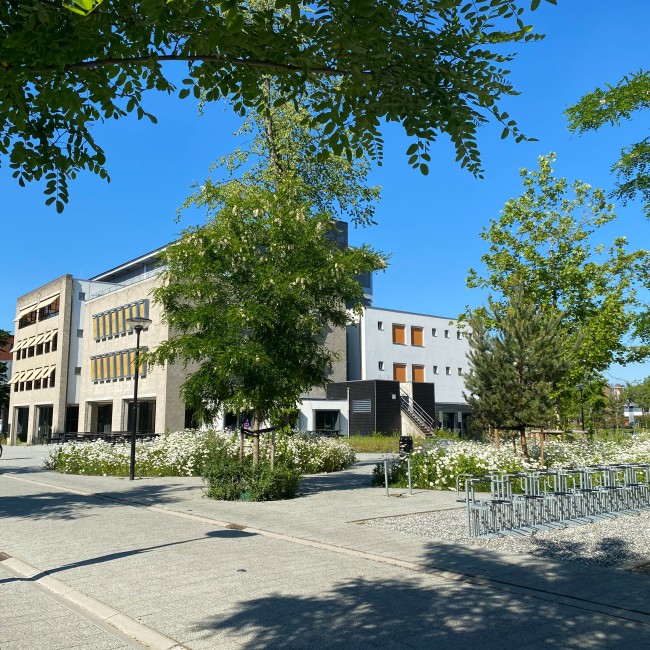
Virtual campus tour
We are proud of our campus. Have a virtual look and discover the Frontier building where you’ll be studying and what more the campus has to offer.
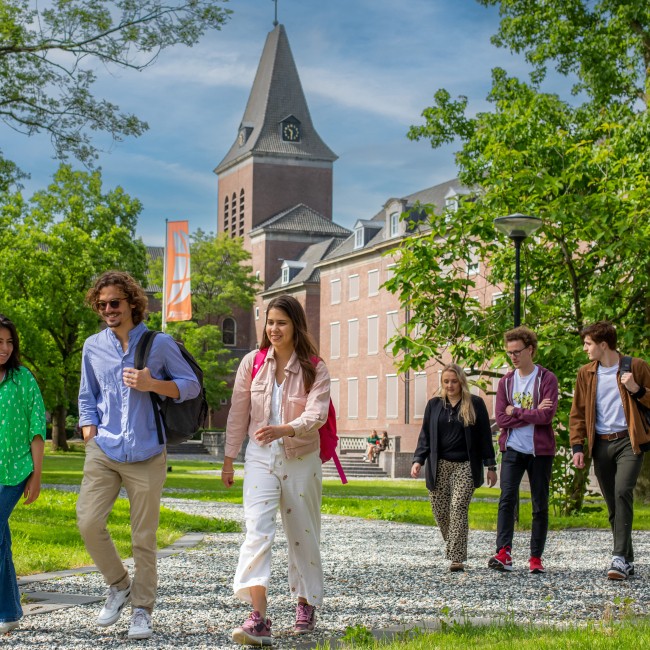
Studying at BUas
What is it like studying at BUas? What does the campus look like and what activities can be undertaken? Is Breda actually a vibrant university town?

Assistance in choosing your study programme
Do you already know exactly what you want to study or do you not have any clue at all? Find out, compare and choose your professional/ academic bachelor’s or master’s programme at BUas.

